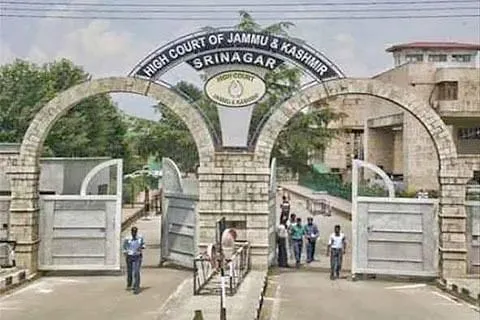Srinagar: The High Court Monday held a married daughter dependent on the Government employee who dies in harness was entitled for compassionate appointment under Jammu and Kashmir (Compassionate Appointment) Rules, 1994.
A bench of Justice Sanjeev Kumar ruled this while allowing a plea by one Shabeena Khan, a married daughter of late Saleema Khan, who died in harness while serving as Senior Technician in the Sher-e-Kashmir Institute of Medical Sciences (SKIMS), Soura in 2014.
The competent authority in SKIMS had formally conveyed to Khan that she was not entitled to compassionate appointment for the reason that under SRO 43 of 1994, a female government servant after marriage was not dependent upon her parents. Khan had challenged the SKIMS communication in a plea through counsel Lone Altaf.
Observing that Jammu and Kashmir (Compassionate Appointment) Rules, 1994 does not make distinction on the basis of gender, the court said: “The definition of a family member as is evident from bare reading of (Rule 1994), does not make distinction between a son and a married son or a daughter and a married daughter. What it speaks of is that such a son or a daughter, whether married or unmarried, must be dependent on the deceased.”
While the court observed that that there could be many instances where an unmarried daughter, who was gainfully employed in a public or private sector, may not be dependent upon the deceased employee, it said instances were not far to be found where a married daughter may still be dependent upon the earnings of the deceased government employee.
Giving an example, the court said that an unemployed non-earning divorced daughter, particularly a Muslim woman, who may not be even entitled to maintenance after Iddat period in case of her divorce, may still be dependent upon her parents.
“Even a married daughter having a physically challenged or fully disabled husband may be dependent upon the earnings of her parents,” the court said. “It is, thus, not correct to generalise that a married daughter or for that matter a married son can never ever be dependent upon the parents.”
Disagreeing with the contention of SKIMS, the court said: “The plea of the respondents that the petitioner being a married daughter is excluded from the definition of a family member given in explanation (d) of Rule 2 of Rules of 1994 is without substance and flies in the face of clear and unequivocal definition of the term ‘family member.’”
The court underscored that once the statutory rules governing the compassionate appointment do not make any distinction between a dependent daughter and a dependent unmarried daughter, it was not open to the employer to carve out this distinction of its own to deny the benefit of compassionate appointment to the dependent family member of its employee dying in harness.
“Once the family member of the deceased employee, whether spouse, a son married or unmarried, a daughter married or unmarried, adopted son married or unmarried, adopted daughter married or unmarried, adopted sister or brother married or unmarried, is found on enquiry by the competent authority dependent upon the deceased Government employee and otherwise fulfils other eligibility requirements, it is not open to the employer to deny the appointment to such member by constricting and limiting the definition of the family member given in the aforesaid rules,” the court said.
It said that a daughter to her parents would always remain a daughter and would not cease to be so on her marriage.
Referring to Jammu and Kashmir (Compassionate Appointment) Rules, 1994, the court said reading the word “daughter” given in the definition of family member in the Rules as only an unmarried daughter and excluding the unmarried daughter there from would be tantamount to reading into the definition of family member something which the rules making the authority never envisaged.
“The SKIMS authorities are not competent in law to read into, modify or alter the plain definition of family member given in the Rules of 1994,” the court said.
It said that in keeping with the Rules of 1994, a married daughter, who was otherwise dependent on the employee dying in harness, could not be excluded for the benefit of compassionate appointment under the rules.
Quashing the communication issued by SKIMS on November 11, 2016, against the petitioner, the court directed SKIMS to have the dependent or legal heir certificate issued by the Additional Deputy Commissioner, Srinagar re-verified.
The court said after the re-verification was carried out, the SKIMS should process the case of the petitioner for compassionate appointment and consider her for such appointment within a period of four weeks.






